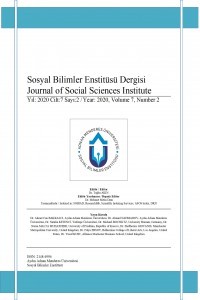Aşı Karşıtlarını İkna Etme Aracı Olarak Şiir: Robert Bloomfield’ın Müjde; Veya, Çiftlikten Haber Adlı Şiiri
2019 yılından bu yana tüm dünyada insanların maruz kaldığı Covid-19 kaynaklı pandemi, insanlık tarihi boyunca salgın vakalarında yaşanan durumlar hakkında merak uyandırmaktadır. Bu tür vakalar araştırıldığında, bulaşıcı hastalıklarla uğraşan bilim adamlarının veya hekimlerin sadece tedavi bulmakta değil, hastalığın aşı yoluyla yok edilmesi aşamasında da zorluklarla karşılaştıkları görülmektedir. Çiçek aşısını icat etmesiyle immünolojinin babası olan Edward Jenner, yöre halkını aşı olmaya ikna etmekte zorlanan doktorlardan biriydi. Çiçek hastalığını ortadan kaldırmak isteyen Jenner, emekçi sınıf şairi olan Robert Bloomfield'den yardım istemiştir. Bir şair olarak Bloomfield’ın tek gücü şiiriydi. Böylece Bloomfield 1804’te insanları aşıyla ilgili yaygın saçma dedikodu ve hurafelerden kurtarmak ve onları çiçek hastalığına karşı aşılanmaya ikna etmek için Good Tidings; or, News from the Farm şiirini kaleme aldı. Dolayısıyla, Bloomfield insanları ölümcül hastalıktan korumaya katkıda bulunmuştur. Bu çalışmanın amacı, Bloomfield'in söz konusu şiirini içerik açısından inceleyerek edebi bir eserin insanları bilimsel yollara yönlendirmede ne kadar etkili bir araç olabileceğini ve bir şiirin bir epideminin yok edilmesinde yararlanılan uygun bir araç olabileceğini ortaya koymaktır.
Anahtar Kelimeler:
Müjde; veya, Çiftlikten Haber, , Robert Bloomfield, , Edward Jenner, , çiçek hastalığı, , aşı, , aşı karşıtları.
Poetry as a Device to Convince Antivaccinationists: Good Tidings; Or, News From the Farm by Robert Bloomfield
The pandemic due to covid-19 that people throughout the world have been exposed to since 2019 arouses curiosity about the situations experienced in epidemic cases throughout human history. When one is in search of such cases, one can encounter that the scientists or physicians dealing with contagious diseases had difficulties in even the phase of the eradication of the disease by means of vaccination. Edward Jenner, who became the father of immunology owing to his invention of the vaccination against smallpox, was one of those physicians having difficulties in persuading local people to have vaccination. It is known that Jenner, aspiring to eradicate smallpox, asked for help from Robert Bloomfield, a labouring-class poet. As a poet, Bloomfield’s only power was his poetry. Thus he wrote Good Tidings; or News from the Farm in 1804 to convince people to be vaccinated and to save them from prevalent absurd rumours and superstitions about the vaccine; and as such, to encourage them to be vaccinated against the deadly disease. Then the purpose of this study is to analyze Bloomfield’s mentioned poem in respect of its content to demonstrate how powerful a literary work could be to lead people towards the scientific, and that a poem may be an appropriate means to be used in the annihilation of an epidemic.
Keywords:
Good Tidings; or, News From the Farm, Robert Bloomfield, , Edward Jenner, , smallpox, , smallpox, , vaccination, , antivaccinationists, ,
___
- BARREL, John. (2006). “Foreword” in Robert Bloomfield: Lyric, Class, and the Romantic Canon. Simon White, John Goodridge & Bridget Keegan (eds.). Lewisburg: Bucknell UP.
- BLOOMFIELD, Robert. (2007). Selected Poems: Robert Bloomfield, Revised and Enlarged Edition. John Goodridge & John Lucas (eds.). Nottingham: Trent Editions.
- BLYTHE, Ronald. (1999). Talking About John Clare. Nottingham: Trent Editions.
- FULFORD, T. and LEE, D. (2006). “The Vaccine Rose: Patronage, Pastoralism, and Public Health” in Robert Bloomfield: Lyric, Class, and the Romantic Canon. Simon White, John Goodridge & Bridget Keegan (eds.). Lewisburg: Bucknell UP.
- HARRIS, Fraser (1915). “Edward Jenner and Vaccination”. The Scientific Monthly , Oct., 1915, Vol. 1, No. 1 (Oct., 1915), pp. 66-85.
- KOTAR, S. L. and GESSLER, J. E. (2013). Smallpox: A History. Jefferson, North Carolina, and London: McFarland & Company, Inc., Publishers.
- MATTHEW, H. C. G. and HARRISON, Brian (2004). Oxford Dictionary of National Biography. Volume 6. UK: Oxford UP.
- OFFIT, Paul A. (2008). Vaccinated: One Man’s Quest to Defeat the World’s Deadliest Diseases. New York: Harper Collins Publisher.
- SCRIVENER, Michael (2011). A Companion to Romantic Poetry. (ed. Charles Mahoney). UK: A John Wiley & Sons, Ltd., Publication.
- Yayın Aralığı: Yılda 2 Sayı
- Başlangıç: 2014
- Yayıncı: Aydın Adnan Menderes Üniversitesi
Sayıdaki Diğer Makaleler
Çekim Modeli Teorisi Literatür Analizi
Marina TAN, Sevcan GÜNEŞ, Filiz AKBAŞ-YEŞİLYURT
Tedarikçi Risk Değerlendirmesi Üzerine Örnek Bir Uygulama
1980 DARBESİ’NİN BATI ÜLKELERİNDEKİ YANKILARI
Sebepleri ve Sonuçlarıyla 15/16 Haziran Büyük İşçi Direnişi
Seligman'dan İyi Oluşa Farklı Bir Bakış: PERMA Modeli
Oyun Mu Kültürü Etkiler? Kültür Mü Oyunu Etkiler?
